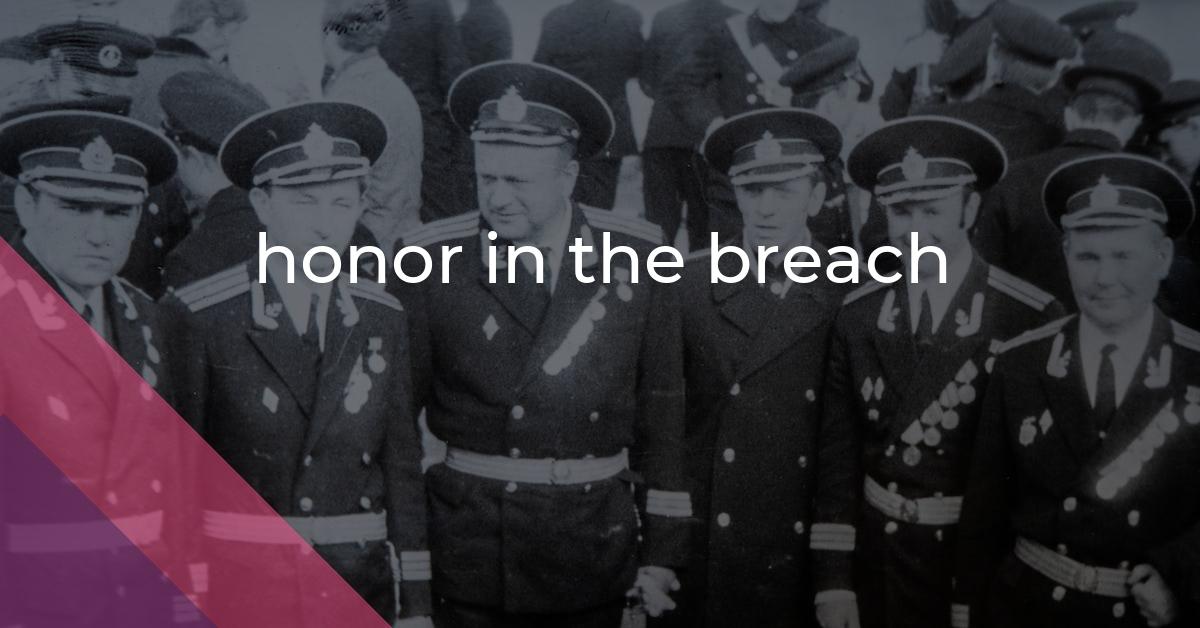honor in the breach: Idiom Meaning and Origin
What does ‘honor in the breach’ mean?
The idiom "honor in the breach" means to not fully uphold or follow a code of conduct or principle that is considered important or honorable.

Idiom Explorer
The idiom "lay on the line" means to take a risk or be open and honest about something, often exposing oneself to potential danger, criticism, or negative consequences.
The idiom "hold with the hare and run with the hounds" means to support or be loyal to two opposing factions, causes, or groups. It suggests being deceitful or indecisive by trying to please both sides.
The idiom "hold up one's end" means to fulfill one's responsibilities or contribute one's fair share in a group or partnership.
The idiom "hold one's tongue" means to not speak or to remain silent, typically when faced with a situation where speaking might be inappropriate or cause trouble.
The idiom "hold one's peace" means to remain silent or refrain from speaking, especially when it is important or expected to do so.
The idiom "go against the grain" means to act or think in a way that is contrary to what is expected or to the usual pattern. It suggests going against the established norms, conventions, or opinions.
The idiom "get away with" means to do something wrong or illegal without being caught or punished.
An idiom that means to go against or defy something, often in a defiant or bold manner.
The idiom "fall from grace" means to lose one's high status or respectability, often due to a mistake or scandal.
The idiom "fall foul" means to come into conflict or disagreement with someone or something, often resulting in negative consequences.
Hidden truths behind idioms
The idiom "honor in the breach" finds its origins in Shakespeare's play "Hamlet." In Act 1, Scene 4, the character named Horatio discusses with Hamlet the recently deceased King Hamlet and his brother Claudius, who has assumed the throne and married the late king's wife, Gertrude. Horatio expresses doubts about Claudius's capability to rule effectively, stating, "So oft it chances in particular men that, for some vicious mole of nature in them, as in their birth, wherein they are not guilty (since nature cannot choose his origin), by the o'ergrowth of some complexion, oft breaking down the pales and forts of reason, or by some habit that too much o'er-leavens the form of plausive manners, that these men -- carrying, I say, the stamp of one defect, being nature's livery, or fortune's star --…may by the lawful means of these, their death (which nature loathes), die themselves."
The phrase "honor in the breach" is derived from Horatio's statements and refers to honorable qualities that are violated or ignored in certain individuals. It conveys the idea that there are occasions when principles, duties, or norms are set aside or neglected due to circumstances or personal interests. In other words, it suggests that there can be instances where breaking with expected behavior or betraying certain virtues may be deemed necessary or justifiable. However, "honor in the breach" also implies a recognition of the inherent value of those principles or virtues, as they carry a sense of honor despite being disregarded.
One example of how "honor in the breach" can be related to idioms is in the phrase "do the honors." This idiom, which means to perform a special function or task, is often used in the context of hosting or leading a social event. When someone "does the honors," they take on a role of responsibility and leadership, ensuring that everything goes smoothly and all participants are taken care of. In the context of "honor in the breach," the idiom "do the honors" can be seen as an example of how individuals may deviate from their expected behavior or responsibilities in order to fulfill a greater purpose or address exceptional circumstances. Similar to "honor in the breach," "do the honors" acknowledges the value and importance of certain actions or duties, even when they are not carried out in the conventional or expected manner.
Another related idiom is "break the buck," which is often used in the context of financial transactions or monetary systems. To "break the buck" means to cause a decline or disruption in the stability or integrity of a system, typically in reference to a fixed exchange rate or the value of a currency. In the context of "honor in the breach," the idiom "break the buck" can be seen as an example of how individuals may need to deviate from established norms or expectations in order to address exceptional circumstances or prevent greater harm. It recognizes the conflict between upholding certain principles or standards and the necessity for change or adaptation in the face of complex or challenging situations. Like "honor in the breach," "break the buck" highlights the tension between what is expected or required and the exceptional circumstances that may justify deviating from those expectations.
The idiom "honor in the breach" is primarily used in discussions about the moral and ethical dimensions of actions and decisions. It serves as a reminder that even in situations where norms are violated or principles are compromised, the original values still hold significance and retain their honorable nature. The idiom appeals to a sense of moral integrity and prompts reflection on the complexities of ethical dilemmas.
It is important to note that the idiom is not commonly used in everyday conversations, and its usage is typically confined to literary or intellectual contexts. However, its origin in one of Shakespeare's most famous plays has contributed to its enduring relevance and occasional use in discussions about ethics and character.
The idiom "honor in the breach" originated from Shakespeare's play "Hamlet" and signifies the presence of honorable qualities that are violated or neglected in certain individuals. It conveys the notion that under exceptional circumstances, there can be justifiable reasons to deviate from expected behavior or compromise on principles, while acknowledging the inherent value of those principles. The idiom is primarily utilized in discussions about ethics and moral integrity, emphasizing the complexity of ethical dilemmas. Though not widely used in everyday conversation, its connection to Shakespeare ensures its continued recognition and occasional application in intellectual or literary contexts.
Example usage
Examples of how the idiom "honor in the breach" can be used in a sentence:
- Despite promising to never cheat, he showed honor in the breach by secretly using the answer key in the exam.
- The politician claimed to have a strong stance against corruption, but his actions were honor in the breach as he engaged in bribery and embezzlement.
- Although the company's motto touted integrity and transparency, their financial practices were honor in the breach, revealing a culture of corruption.
More "Violation" idioms
We missed the mark - nothing found.



